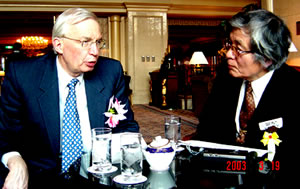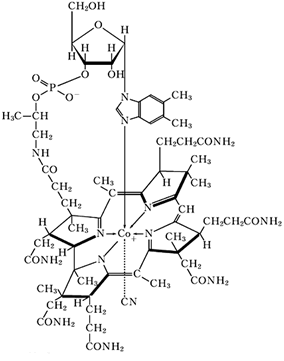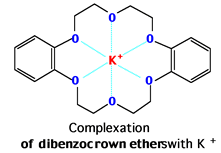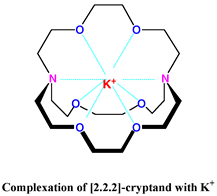 |
 |
 |
 |
|
Chemical Education International, Vol. 4, No. 1, AN-1, Received May 12, 2003 To the Youth of the World Who aspire to a carrier in Chemistry Message
from Nobel Laureates to Young People (4) INTRODUCTION The intended readership of the interviews published in CEI are senior high school students who are at a point in their life where they must make decisions about their future career, or first year university students in science and technology who must begin to specialize in a chosen field of study. We are extremely grateful to Prof. Lehn for his appreciation of the idea of this series of interviews and for kindly sparing us his precious time for the interview. This interview with Prof J. M. Lehn (pictured left), by Prof. Y. Takeuchi (right) and Prof. M.M. Ito was carried out at the Lobby of Rihga Royal Hotel Tokyo on March 19, 2003. CEI:
Chemical Education International JML: Professor Jean-Marie Lehn, CEI: Professor Lehn, thank you very much for kindly sparing your precious time for the Chemical Education International, an electronic journal published by the IUPAC Committee on Chemistry Education (CCE). The purpose of that journal is basically to distribute information on chemistry education to teachers of chemistry around the world. However, we expect that through the teachers, students, and more particularly high school students, will read the journal. So, it is principally intended that this interview will be read by high school students who are in the process of deciding their career pathways. So the questions would be mostly about your youth. I don't know about the French education system, but I suppose you must have commenced your education at the kindergarten stage? JML: Yes. CEI: At this age or even before, were you generally interested in nature? JML: Yes, I suppose so, but it depends on what you call 'nature' and 'interest'. I was in a small town of 4000 people, so we were in contact with nature simply because we were running around all the time. But, nothing at that stage was scientific so to say. CEI: I mean some children, for instance, like collecting insects or leaves or that kind of thing. Did you have this kind of hobby? JML: Good question – I'm trying to remember. Maybe to some extent, but it wasn't really a 'collector'hobby, except for pictures of all kinds of different animals that one could collect together with sweets. There I got to know the existence of so many different animals! CEI: How about at the primary school stage? Were there any science lessons given in school when you were at this age? JML: In primary school? Yes, we had at that time something which I found very useful and as far as I remember interesting which we called 'leçon de choses' - lesson of things. It was a sort of global approach to things, where, by contact with objects, we were learning about how things function, their constitution, and so on. It was, I think, a very good approach to develop your curiosity. CEI: And did you like this study of things? JML: Yes, as far as I remember I liked it. You know, it was a time where I don't remember all the things that were going on. I just remember that we had these lessons and that I was interested in them. I cannot say that I had a special interest or some kind of passion for it. I don't have the impression that that was the case. On the other hand, in the countryside one is always in contact with all kinds of objects, events, etc. CEI: What subject did you like best when you were in Elementary or Junior High school which is for children up to 15 years of age. JML: At that time I was studying what we called in France the 'classics'. That means I did Latin and Greek as well as German and English. Not so much science, more letters. CEI: So this was more the traditional path of study? JML: Yes, at that time it was more traditional and it is true that it was considered to have a better status than studying mathematics and sciences. The classics, with languages and Greek and Latin, were considered better than the other sections! I'm not sure this was right, but that's the way it was. CEI: In high school, from 15-18 years of age - the pre-university stage - were many science and mathematics lessons given? JML: Yes, even though I was studying the classics, we still had several hours of mathematics per week and of course physics and chemistry. Physics and chemistry as such started as special topics only in the last three years of high school. CEI: So this means that at the high school stage there was no classification of students for science? JML: No, that was not actually the case. In fact, students were classified into two groups. One was the classics, which had emphasis on letters and classical languages, and the other one was 'moderne' (modern), which had more mathematics and more present-day language learning such as English and German, as well as physics and chemistry. Then you had two exams - 'baccalauréat' - at the end; the first one was classics or modern, and the second one had one section on philosophy, one section on experimental sciences and one on elementary mathematics. But 'elementary' was not so elementary in fact! I began to be very interested in chemistry and physics in the year before the first baccalaureate and then in the year between the first and the second at around 16 or 17 years of age. CEI: Do you remember a teacher, or teachers, who had particular influence on your choice of career? JML: Yes, there was one teacher who was extremely important and who was in fact a primary school teacher. I don't think he was so important for chemistry because we did not have chemistry as such, but to help children from this small town to be able to go from primary to high school. There was an exam to enter high school and he helped a lot - he was a very dedicated person who did unpaid extra work to teach children because he liked it and it was his job, his duty. Pierre Charlier was his name, and he played a very important role. I still see him from time to time. CEI: He must be very proud of your achievements. JML: Oh yes, I have invited him to a number of events. And then at high school there were a few teachers, especially in philosophy, because I wanted first to study philosophy; not chemistry, not science, but philosophy. CEI: So this means that you really wanted to be a philosopher, rather than a chemist at that stage? JML: Yes, I entered university to study philosophy. But in France, at that time at least, if you wanted to study philosophy you had to take one exam in science, which was a good thing. So philosophers had to know something about science. I had become quite interested in chemistry in the year just before university. Because I found that chemistry was a very logical science with classifications where you had relationships between things, where you had analogies, functional groups, structural and reactional categories. So I liked this logical, Periodic Table-type appearance where you can deduce properties from the type of groups and so on. So in the last year before university I took two baccalaureates in one year rather than one. And thereafter, in order to keep both options open, philosophy or science, I took as first year at the University the SPCN (Sciences Physiques, Chimiques et Naturelles) course. CEI: Is it unusual to do two baccalaureates in one year? JML: Yes it was unusual; I took in philosophy in June and experimental sciences in October of that same year. I got both of them, which gave me the opportunity to orient myself in either direction. I entered university with the intention to do philosophy, but then I found more and more that chemistry was really very interesting and I began doing experiments at home. I bought products from the local drugstore. CEI: You mean that you began doing experiments by yourself? In your room, or...? JML: My parents lived in the countryside in this small town, so I did the experiments in the courtyard. I started doing experiments using the 'Gatterman'(2)- you know this German preparative chemistry book? - to learn to do distillation, to synthesize indole and other compounds.
CEI: That's fantastic. Without any private tuition? JML: Without any private tuition. I had a good friend who was also very interested in that, and so we bought chemicals and glassware. During my first year at university, when it is very general, we did a lot of experiments at home. CEI: So at school you attended philosophy classes and at home you did chemistry experiments? JML: Ah, well philosophy was in the last year of high school, and then in the first year of university I did the experiments and also I took this exam in general sciences, which was on chemistry, physics, biology, and some mathematics. In that year I developed more and more interest in chemistry. It was especially due to the experiments that chemistry appeared as a very creative science, because you make things, you fabricate, you can transform matter; it is quite fantastic when you feel, as a youngster, that you have a way to make compounds and to know what you are making! That was very interesting, and then I said "All right, it's nice to be a philosopher, but you have no experiment to control what you think". Of course, you can speak, you can tackle very big problems - truth, psychological problems, lots of metaphysical problems - all these kinds of problems that exist in philosophy, but you have no check - you cannot check it. And so I thought that with chemistry you have something that you can check. I decided to do science and I took chemistry, organic, physical, inorganic as well as physics for two years. CEI: So in France, you can graduate from university after three years. Is that right? JML: I was sort of lucky because at that time there was a reform introduced into the university system. After the first year of general science, the SPCN, we had to choose between different curricula. At that time there was a section which was only two years long rather than three, so I thought "That's the quickest one, I'll do that". It happened that in organic chemistry lectures I had a highly inspiring teacher who later on became my Ph.D. supervisor, Guy Ourisson. You may perhaps know him; he’s a very well known organic and natural product chemist, in Strasbourg. CEI: Yes, I know him only by name, though. A terpene chemist? JML: Yes, a terpene chemist at that time. I did triterpene chemistry for my Ph.D. His courses in the third year of university were very exciting and I said to myself "I want to do this". And then I joined his research group for my Ph.D. CEI: So you started your research career as a natural products chemist? JML: Exactly. But with a special emphasis. It happens that at that time nuclear magnetic resonance (NMR) was just being introduced into organic chemistry. We got a Varian A60, the small NMR machine, and Ourisson put me in charge of it. Since I was interested in physics, I learned NMR spectroscopy, so that my Ph.D was partly synthesis and derivatives of natural products and a lot of spectroscopy. CEI: I remember I read your article on nitrogen inversion. JML: Yes, but that was later on. That was when I had my own group. My Ph.D. was the study of triterpenes by nuclear magnetic resonance spectroscopy. CEI: And so to one of my most important questions - when did you get interested in macropolycyclic chemistry, and how did you get involved? JML: That's a complicated thing because, as I told you, I was interested in philosophy. I'm still interested in philosophy! But what I was and still am most interested in is the philosophy of knowledge. What is knowledge? What is truth? What are the logical steps you have to pursue, and so on. Once having become a scientist, a chemist, and after returning from my postdoctoral position with Woodward - I was with Woodward(3) at Harvard working on the synthesis of Vitamin B12, which was highly synthetic chemistry - I wondered what to do.
On one hand I did not want to continue with natural products because I got my Ph. D. in that field, and I did not want to continue on with my Ph. D. work. I wanted to get out of it simply because I wanted to do something different. Because in my university years I had taken some courses in physics and optics, I was interested in two areas. First of all, more physical chemistry, or physical-organic; these were studies which concerned NMR and what you have just mentioned - nitrogen inversion. On the other hand, this interest in philosophy was still there, and the seat of knowledge is the brain. So "How does the brain function"? That is again a big question that nobody can solve for the moment, but I thought one interesting, at least a possible way to contribute to some aspects of the functioning of the nervous system, is to study the ionic currents which exist in the nerve - sodium and potassium exchanges and currents in particular. How can a chemist study that? You can do experiments in physiology, but then you are a biologist. If you are a chemist what do you do? I thought that one thing to do would be to try to understand how sodium and potassium can cross a membrane, because this is the basis of the ion influx moving along neurones. So I was interested in seeing if you can transport sodium or potassium through membranes. At that time there were a few papers on valinomycin, a macrocyclic natural product moving along neurones you know. It was discovered by Brockmann in Germany; its structure had come out and the synthesis was done by Shemyakin in Moscow, and the group of Pressman in California had shown than valinomycin makes the membranes of mitochondria permeable to potassium. So I thought, "OK, here there are compounds which are able to transport potassium through membranes. Let's try to study these kinds of things". First, I wanted to make cyclic peptides but then I thought that cyclic peptides were not so interesting for chemists because they are very sensitive to the environment, water and acid and so on. What else could one do? Ethers were a possibility. There was already a paper by Wilkinson, saying that you can dissolve alkaline metals into polyethers. Then, Pedersen's first communication on crown ethers appeared.
I thought that the ring structures described by Pedersen were nice but not really what you want, because you want something that is 3-dimensional. A spherical ion is 3-dimensional – you don’t want a ring, you want spheroidal cavities. And so we started to make the macrobicyclic cryptand cavity compounds - and obtained their selective inclusion complexes, the cryptates, with alkali cations. That was the beginning.
CEI: So the naming of the cryptate comes from Greek, I guess. JML: It comes from Greek, because I had studied Greek. Exactly. CEI: The process of forming the idea of supramolecular chemistry is very philosophical. It probably explains how you formalized your ideas. JML: You are quite right. Probably this interest in philosophy – you see I was very interested in people like Emmanuel Kant, because he had a global view, which tried to give a coherent interpretational system. So I think it happened by progressive induction, not deduction, inasmuch as this rather narrow approach of binding potassium and sodium led to the idea that in distinguishing between potassium and sodium and lithium and rubidium and cesium, you perform a process which is to recognize these ions. So the second step, beyond the structures of the binding agents, was their selectivity – which means molecular recognition. The cryptates were obtained at the end of the 1960s. Then molecular recognition emerged – the idea that to bind selectively means that you have to recognize. This was at the beginning of the 1970s, let’s say the first half. And then you realize that in order to recognize you have to have interactions, and these interactions are weak bonds. So there must be a general coherent chemical system, a chemistry based on non-covalent bonds, and this I called supramolecular chemistry. There was a sort of, more or less, logical follow-up by progressive generalization from selective binding, to molecular recognition and to supramolecular chemistry. CEI: Do you have many opportunities to be involved in chemistry education? JML: I am interested in education and I give lectures at universities and meetings but I also like to go from time to time to high schools and give lectures. I do this regularly. In fact, do you know Professor Nagai from the Nagai Foundation? I promised him that I would come back to give some lectures at high schools in Japan. I haven’t had time to do it as yet, but I regularly give lectures at high schools in France; I think that it is important to talk to the young students. CEI: I heard you have done many things for teaching chemistry besides lecturing. JML: We developed a game called "MOLEKO", which is like a Monopoly, but it is a "Monopoly of molecules", where houses and hotels are replaced by atoms, and you have to build molecules. CEI: What do you think about the role of chemistry in the 21st century? JML: I think, you know, chemistry is a science where some chemists think that if you forget the name ‘chemistry’ you lose your identity. I don’t think so. Chemistry is everywhere – it is correct that I am a chemist because, you know, it happens that you cannot do everything! I think we should be scientists first. It doesn’t bother me to be a chemist or a physicist or whatever. But what I like about chemistry is what I consider its specific features. I think that chemistry has, first of all, relationships with all other sciences; it is a central science and is very important for all the others. You cannot develop computers without chemistry because you have to make the materials. You cannot develop pharmaceuticals without chemistry because you have to make the molecules. You cannot go into space without chemistry because you need, again, the materials, and so on. That’s one thing. The other aspect, which I think is probably even more important, is that chemistry can act on matter. With chemistry, it’s sort of a feeling of power, it’s Prometheus bringing to mankind the fire stolen from heaven. The fire transforms things, and chemistry is really the fire that transforms matter. You are able to act on substances, to understand those which already exist, and as I realized in the first years when I did chemistry for myself, the possibility to make things which did not exist. Since I am very much interested in art also – music especially – I think this aspect of chemistry is more important than all the others and it defines chemistry, its special essence. Of course it’s important to have the Schrödinger equation, of course it’s important to know the particles, of course it’s important to know the origin of the universe – but chemistry has something in common with art, which is, you act and you create something. You don’t even need to understand (OK, I want to understand!), but you create an object, you have an activity which is a creative activity this is for me the most important thing. CEI: Yes, I remember the cover page of your textbook on supramolecular chemistry(4).
JML: Yes, the famous sculpture by Rodin(5). The sculpture by Rodin personifies chemistry for me. It is probably the best for showing how I see chemistry. This hand - which expresses a sculpture out of matter, I think that is the hand of the chemist! CEI: Lastly, could you give a message to youngsters all over the world? JML: I would say the most important thing is that people should try to learn more science. One reason is obvious - we depend so much on science, we should know a bit more science simply to understand what is going on and what is around us. But in addition, science imparts a way of thinking, a rational evaluation, objectivity and rigor, which also leads to think before acting too rapidly. If more people in the world, especially politicians, were to think about things before acting, then the world would be a better place to live in. So I would recommend to youngsters, if for instance you are ready to put in three or four hours per week to learn to play a game such as tennis, it is much more important for you to reserve some hours for science because, for your life, science is much more important. Science is a basic part of our culture. We not only need to have the knowledge of science, but also the spirit, the approach, and this is the most important. CEI: Thank you very much indeed. JLM: You are welcome. References
Last modified 14.06.03 |
|
| CEI is a newsletter of the Committee on Chemistry Education (CCE) of IUPAC |
 |
 |
 |
 |

 The
Committee on Chemistry Education (CCE) of IUPAC edits and issues
an electronic journal, Chemical Education International (CEI).
For the benefit of those who aspire to a career in chemistry, each
issue contains a short interview with a Nobel Laureate in chemistry.
In this way, we hope to provide a profile of those who are at the
forefront of chemistry and give aspiring chemists role models for
their future endeavors.
The
Committee on Chemistry Education (CCE) of IUPAC edits and issues
an electronic journal, Chemical Education International (CEI).
For the benefit of those who aspire to a career in chemistry, each
issue contains a short interview with a Nobel Laureate in chemistry.
In this way, we hope to provide a profile of those who are at the
forefront of chemistry and give aspiring chemists role models for
their future endeavors.



